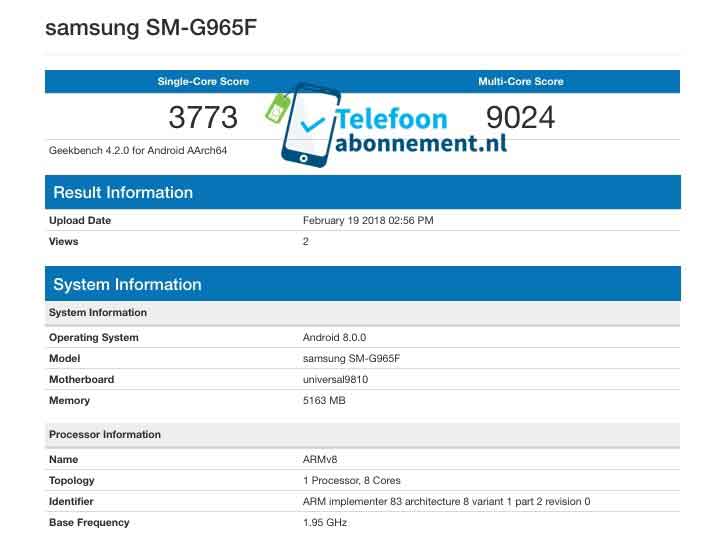Just how fast is the Samsung Galaxy S9+, the upcoming higher-end model of the tech giant’s premium smartphone line? The answer, unsurprisingly, might be ridiculously fast.
The Samsung Galaxy S9+ (and Galaxy S9) has already leaked in full merely days ahead of its MWC [Mobile World Congress] 2018 reveal, though the benchmark scores of its Exynos version have remained elusive until now. The Exynos 9810-based model of the Galaxy S9+ has been added to the Geekbench database, hinting at one heck of a powerhouse Android phone.

Alleged Samsung Galaxy S9+ benchmark scores on Geekbench
The Exynos variant of the Galaxy S9 had posted a single-core score of 3,648 points and a multi-core score of 8,894 points — both impressive marks, to be clear — yet the Galaxy S9+ built around the same processor, except with 6GB of RAM instead of 4GB, notched more points on the same tests. On single-core tests, the S9+ scored 3,773 points; 9,024 on multi-core.
By comparison, last year’s Exynos 8895-based Samsung Galaxy S8+ scored on average 2,159 on single-core and 7,235 on multi-core. It also had 6GB of RAM. Compared to past numbers, these alleged scores suggest a significant performance bump.
SEE ALSO: Samsung Galaxy S9, S9+ launching in the Philippines in March
Compared to a Samsung Galaxy S9+ with the latest Qualcomm Snapdragon 845 chip under the hood? Samsung’s chip-making business still wins by a comfortable margin — at least based on an S9+ unit mated to a Snapdragon 845 processor that was spotted on Geekbench last December. That model, which will be sold in the U.S. and a few other markets, achieved 2,422 points on single-core and 8,351 points on multi-core.
Compared to the numbers of the S8+, the alleged scores of the Exynos 9810-based Samsung Galaxy S9+ suggest a significant performance bump. And compared to the S9+ with Snapdragon 845 chip? The Exynos variant still wins by a comfortable margin. However, it still lags behind the new iPhones.
Yet despite this exciting news, the Galaxy S9+, regardless of the processor and RAM choice, may still lag behind the Apple iPhone 8, iPhone 8 Plus, and iPhone X, which all typically score more than 4,000 and 10,000 points on Geekbench’s single-core and multi-core tests. Samsung will hope to rally behind stronger real-world performance when the Galaxy S9+ arrives in stores next month or the month after, if that is indeed the case.
Story via Telefoon; image via WinFuture
Share this Post



